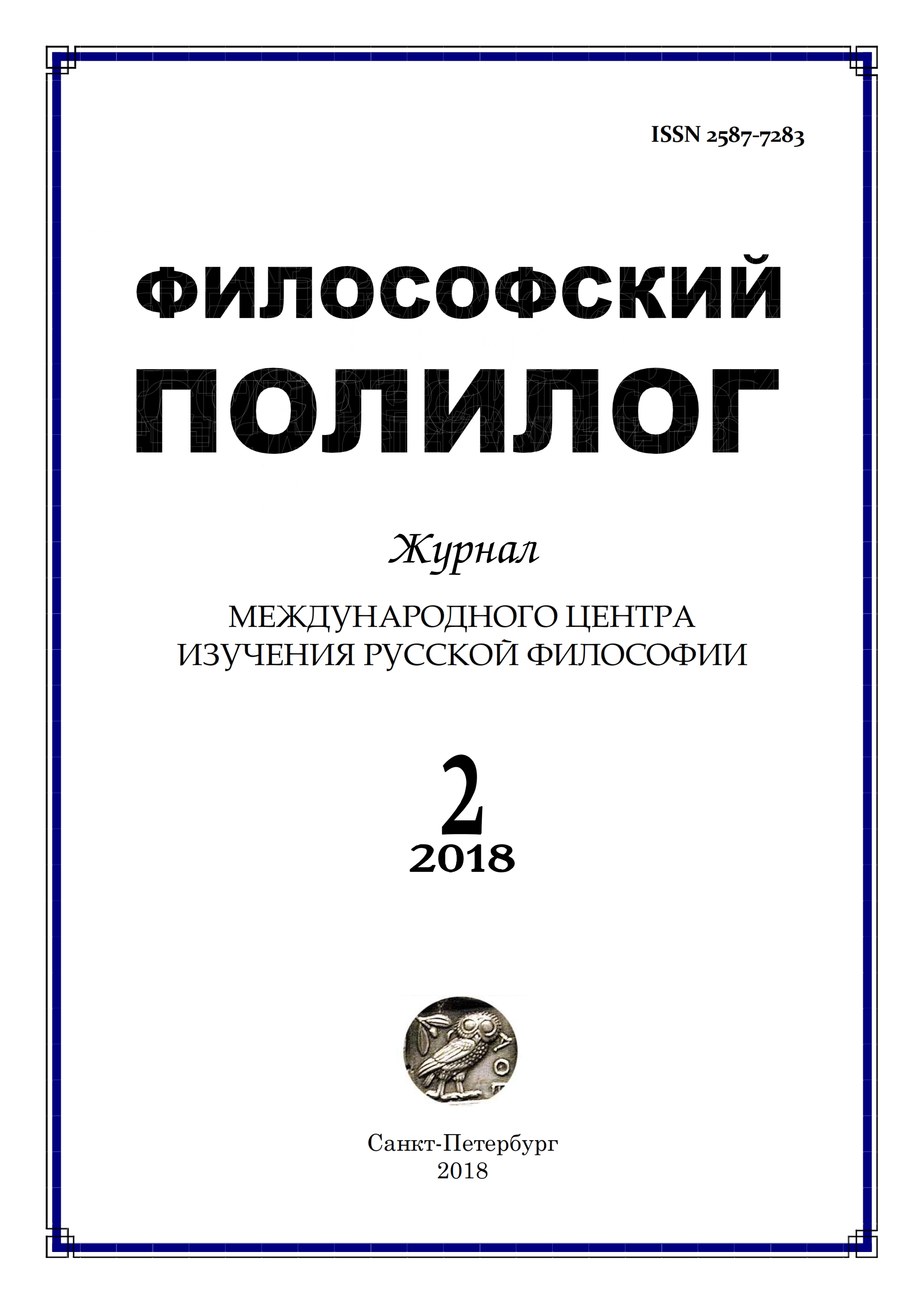Reception paradigms of L. P. Karsavin’s philosophy in German studies
Abstract
The author focuses on the communication between philosophical cultures as a form of intercultural communication to conclude that it is a polylogue. It is shown that the leading role is played here by a historian of philosophy who can either arouse or block the interest to a philosopher. S. L. Frank’s ideas help the author to stress that the traditional intercultural communication Ours–Alien dichotomy can be transformed into that of Ours–Other. Thus, the goal of intercultural philosophy communication is seen in the overcoming of the ontological alienation between its participants to achieve the state of I–You-relationship, when the Other becomes to feel belonging to the culture he studies and at the same time keeps his otherness. G. A. Wetter’s interpretation of Karsavin’s philosophical works is analyzed to prove that a historian of philosophy is able to deeply understand the ideas of a philosopher living in different cultural and religious environment. The author argues that considering Karsavin’s personalism in the paradigm of Christian humanism can make his works more interesting for European scholars. Treating Karsavin’s metaphysics as a justification for Eurasianism (Julia Melikh) makes it possible to consider his position as part of actual European philosophy. It is concluded that in order to achieve the goal of intercultural philosophy communication historians of philosophy should thoroughly understand their own culture and that of the philosopher studied.
References
Valdenfels, B. Svoya kul´tura i chuzhaya kul´tura. Paradoks nauki o “Chuzhom” [One’s own culture and a foreign culture. The paradox of the science of the “Other”]. URL: http://archive.li/dLj0e#selection-39.0-43.56.
Vetter, G.A. L. P. Karsavin [L. P. Karsavin], in Russkaya religiozno-filosofskaya mysl´ XX veka [Russian religious and philosophical thought of the 20th century], ed. N. P. Poltoratskiy, Pittsburg, 1975. URL: http://odinblago.ru/vetter_ karsavin.
Gavryushin, N. Perepiska A. Vettera s L. Karsavinym [Correspondence of A. Vetter and L. Karsavin], transl. from French by A. N. Gavryushin, in Simvol, 1994, No. 31.
Karsavin, L.P. Gosudarstvo i krizis demokratii [The state and the crisis of democracy]. URL : https://cyberleninka.ru/article/v/gosudarstvo-i-krizis-demokratii.
Karsavin, L.P. O nachalax [About the principles], Berlin: Obelisk, 1925.
Nazarova, O. Ezhegodnik “Issledovaniya po istorii russkoy mysli”. Redaktory M. Ko¬le¬rov, N. Plotnikov [Yearbook “Research on the history of Russian thought”. Editors M. Kolerov, N. Plotnikov], in Istoriko-filosfskiy ezhegodnik 2012 [Historical and philosophical yearbook 2012], Moscow: Kanon+, Reabilitatsiya, 2013.
Nazarova, O. Sovremennye nemetskie issledovaniya tvorchestva S. L. Franka [Mo¬dern German studies of S. L. Frank’s work], in Mysl´, 2014, No. 16.
Ter-Minasova, S.G. My uchim ne tol´ko tomu, “kak skazat´”, no i “chto skazat´” [We teach not only “how to say”, but also “what to say”], in Vestnik Moskovskogo universiteta. Ser. 19: Lingvistika i mezhkul’turnaya kommunikatsiya [Bulletin of Moscow University. Ser. 19: Linguistics and Intercultural Communication], 2004, No. 1.
Hagemaister, M. Novoe srednevekovye Pavla Florenskogo [The new Middle Ages of Paul Florensky], in Issledovaniya po istorii russkoj mysli [Research on the history of Russian thought], Moscow: Modest Kolerov, 2003.
Khromova, E.B. O roli prepodavaniya inostrannogo yazyka kak posrednika v dialoge kul´tur [On the role of teaching a foreign language as an intermediary in the dialogue of cultures], in Filologicheskie nauki. Voprosy teorii i praktiki, 2012, vol. 1, No. 7 (18).
Frank, S.L. “Ya” i “my” (K analizu obshcheniya) [“I” and “we” (To the analysis of communication)], in Istoriya filosofii [History of philosophy], 2010, No. 15.
Tsygankov, A.S. Peter Elen kak issledovatel´ filosofskogo naslediya S. L. Franka [Peter Ellen as a researcher of the philosophical heritage of S. L. Frank], in Ellen, P. Ontologiya i antropologiya S. L. Franka [Ontology and anthropology of S. L. Frank], transl. from German by Cygankov, A.S.], Moscow: IPh RAS, 2017.
Karsavin, L. Perí archon. Ideen zur christlichen Metaphysik [Perí archon. Ideas of Christian metaphysics], Memel, 1928.
Mehlich, J. Die Philosophisch-Theologische Begründung des Eurasismus bei L. P. Karsavin [The philosophical-theological grounding of Eurasianism by L. P. Karsavin], in Studies in East European Thought, 2000, vol. 52, No. 1–2.
Seitschek, H.O. Christlicher Humanismus [Christian humanism]. URL: https:// de.zenit.org/articles/christlicher-humanismus.
Wetter, G.A. L. P. Karsawins Ontologie der Dreieinheit. Die Struktur des kreatür¬lichen Seins als Abbild der göttlichen Dreifaltigkeit [L. P. Karsavin’s ontology of the Trinity. The structure of created existence as a reflection of the Divine Trinity], in Orientalia Christiana Periodica, 1943, IX, No. 3/4.
Wetter, G.A. Zum Zeitproblem in der Philosophie des Ostens. Die Theorie der “Allzeitlichkeit” bei L. P. Karsawin [On the problem of time in the philosophy of the East. L. P. Karsavin’s “theory of all-unity”], in Scholastik, 1949, Book 3.

